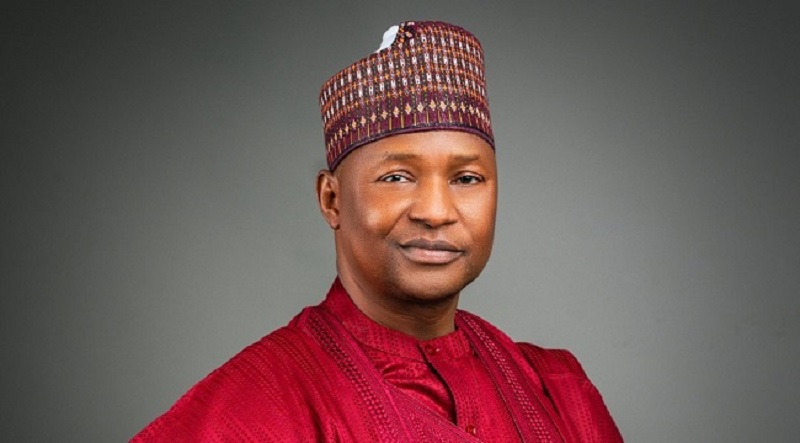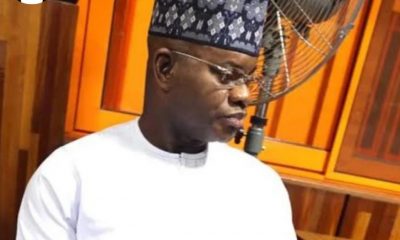General
Flutterwave, EFCC to Tackle Fraud, Boost Digital Security

By Adedapo Adesanya
Flutterwave has partnered with the Economic and Financial Crimes Commission (EFCC) to establish a state-of-the-art Cybercrime Research Centre as part of efforts to tackle internet crime and enhance the security of business transactions.
According to a statement, the San-Fransisco-based unicorn signed a Memorandum of Understanding (MoU) with the anti-graft agency on June 14, 2024, in the Federal Capital Territory (FCT), Abuja.
The deal was signed by the EFCC Secretary, Mr Mohammadu Hammajoda, and the chief executive of Flutterwave, Mr Olugbenga Agboola in the presence of the EFCC chairman, Mr Ola Olukoyede; the Director of Federal Bureau of Investigations (FBI), Mr Christopher Gray, and other senior officials from both agencies.
The partnership will see the construction of the Cybercrime Research Centre, which will be established at the new EFCC Academy in Abuja.
The centre would serve as a hub for advanced research, training, and capacity building in the fight against financial crimes. The areas of focus of the centre include advanced fraud detection and prevention, collaborative research and policy development, youth empowerment and capacity building, technological advancement and resource enablement, among other key areas.
Speaking at the event, Mr Olukoyede said, “This partnership marks a significant leap forward in our efforts to combat financial crimes and ensure a secure financial landscape for Nigerians. The Cybercrime Research Centre will significantly enhance our capabilities to prevent, detect, and prosecute financial crimes.”
On his part, Mr Agboola said, “This initiative underscores our commitment to creating a fraud-free financial ecosystem and leading the charge in safeguarding transactions across Africa.
“We applaud the EFCC’s relentless efforts to combat internet fraud and other illicit activities in the financial sector.”
The statement noted that other functions will include advanced fraud detection and prevention to detect and prevent financial fraud. The centre will offer comprehensive training for law enforcement and industry professionals to combat modern financial crimes effectively.
It will also serve as an entry point for collaborative research and policy development.
“Engaging in joint research initiatives and policy formulation to enhance the understanding and regulation of financial crime. The centre will provide a platform for the exchange of ideas and best practices between the public and private sectors.”
The centre would also provide a sustainable lifeline to youths across the country.
“Youth Empowerment and Capacity Building: Providing high-end training and research opportunities for 500 youths, equipping them with the skills needed to navigate and excel in the digital economy.
“Technological Advancement and Resource Enablement: Creating a repository of advanced tools, technologies, and resources to support financial crime investigations, including protocols for addressing emerging threats such as cryptocurrency-related crimes,” the statement concluded.
General
Nigeria Okays Alphanumeric Digital Postcode System to Boost Delivery

By Adedapo Adesanya
Nigeria has finally approved the use of an alphanumeric digital postcode system for the country, 17 years after it was first considered.
According to the Minister of Communications and Digital Economy, Mr Bosun Tijani, the system was okayed at the Federal Executive Council (FEC) meeting on Wednesday, chaired by President Bola Tinubu, in line with the ministry’s strategic blueprint.
He said working in collaboration with the Nigerian Postal Service (NIPOST), the ministry will introduce a modern, geospatially intelligent addressing system that improves accuracy across the country and enables faster and more reliable mail and parcel processing.
“Beyond strengthening postal operations, the Digital Postcode System will also serve as an important national enabler supporting better national planning, improved emergency response, more efficient logistics and e-commerce, and the delivery of government services.
“As our digital economy continues to grow, foundational systems such as this play an essential role in building the infrastructure required to connect people, businesses, and services more efficiently across the country,” he said.
He noted that the approval represents another step forward in the Mr Tinubu-led administration’s commitment to building the enabling environment to support a modern, inclusive, and globally competitive digital economy.
On her part, Ms Tola Odeyemi, the Post Master General and chief executive officer of NIPOST, said the implementation is a foundational step toward building the digital infrastructure required for a modern economy.
“First conceptualised in 2009, this initiative is finally becoming a reality in 2026 under the leadership of President Bola Tinubu and the Minister of Communications, Innovation and Digital Economy, Dr Bosun Tijani,” she wrote on X, formerly Twitter.
“A digital postcode system is more than a postal reform. It is critical national infrastructure that enables e-commerce, logistics, emergency services, financial inclusion, security, urban planning, and effective public service delivery,” she added.
By introducing an alphanumeric addressing framework, Nigeria will now be able to identify locations with far greater precision across cities, towns, and rural communities.
“This will significantly improve how goods, services, and digital platforms reach Nigerians everywhere.
“This milestone reflects a shared commitment by the Federal Government to strengthen Nigeria’s digital backbone and unlock new opportunities for innovation, commerce, and national development,” she further stated.
General
NCDMB Targets Midstream Compliance to Boost Nigeria’s Industrial Growth

By Adedapo Adesanya
The Nigerian Content Development and Monitoring Board (NCDMB) has intensified its compliance drive in the oil and gas midstream segment, convening a high-level sensitisation workshop aimed at deepening adherence to the Nigerian Oil and Gas Industry Content Development Act.
The workshop, themed Compliance with the Provisions of the NOGICD Act 2010: A Pathway to Industrialization, held in Lagos, drew key operators across gas processing, transportation, storage and infrastructure development.
Speaking on behalf of the Executive Secretary of NCDMB, Mr Felix Ogbe, the Director of Monitoring and Evaluation Division, Mr Omomehin Ajimijaye, described the midstream sector as “a critical bridge between upstream production and downstream utilisation.”
“The midstream segment plays a pivotal role in gas processing, transportation, storage and infrastructure development, all of which are essential pillars for achieving Nigeria’s industrialisation agenda,” Mr Ajimijaye said.
Mr Ajimijaye stressed that adherence to the NOGICD Act goes beyond regulatory obligation.
“Compliance with the NOGICD Act is not merely a statutory requirement,” he stated. “It is a strategic imperative for sustainable national development.”
He explained that the programme was structured to clarify registration processes, Nigerian Content Equipment Certification, expatriate quota requirements, statutory reporting templates and submission timelines.
“Our objective is to deepen stakeholders’ understanding of compliance requirements, address recurring gaps identified during Monitoring and Evaluation reviews, and foster constructive dialogue on operational realities within the midstream space,” he added.
According to Mr Ajimijaye, the board has received feedback from operators highlighting challenges in meeting Nigerian Content obligations, including reporting complexities and varying interpretations of certain provisions of the Act.
“As a responsive regulator and development-focused institution, we remain committed not only to enforcing compliance but also to providing guidance, clarity and the necessary support to enable stakeholders succeed,” he assured participants.
With Nigeria positioning gas as a transition fuel and economic growth driver, regulatory clarity in the midstream space is essential to unlocking investment and local capacity development.
The participants received technical presentations from key NCDMB divisions, including: Monitoring and Evaluation Division, Project Certification and Authorisation Division, Capacity Building Division and Zonal Coordination Division.
The interactive sessions provided practical guidance on engagement protocols with the Board and strengthened collaboration between regulators and operators.
General
AGF Fagbemi Takes Over Malami Prosecution from DSS

By Adedapo Adesanya
The Minister of Justice and Attorney General of the Federation, Mr Lateef Fagbemi, has taken over the prosecution of his immediate predecessor, Mr Abubakar Malami.
Mr Malami is facing terrorism and illegal firearms possession charges brought against him by the Department of State Service (DSS).
Mr Fagbemi, a Senior Advocate of Nigeria (SAN), took over the trial from the secret police on Wednesday at the Federal High Court in Abuja.
The Director of the Public Prosecution of the Federation, Mr Rotimi Oyedepo, announced the Attorney General’s appearance in the matter.
Mr Oyedepo told Justice Joyce Abdulmalik that the trial cannot proceed because Mr Fagbemi has just taken over the prosecution.
He informed the court that the prosecution needed more time to familiarise itself with the facts of the case.
Counsel to the defendants, Mr Adedayo Adedeji, who did not oppose the application, however, urged the court to strike out the matter if the prosecution fails to open its case at the next adjourned date, citing lack of diligent prosecution.
Justice Abdulmalik subsequently adjourned the matter to March 10 for trial and for the prosecution to formally open its case.
The court had, on February 27, admitted Malami and his son, Mr Abdulaziz, to N200 million bail, with two sureties, each one of whom must own landed property either in Maitama or Asokoro.
Justice Abdulmalik had said that the title of the property must be deposited with the Deputy Chief Registrar of the Court along with valid international passports.
The sureties were also ordered to depose to an affidavit of means and submit their two recent passport photographs to the court.
Mr Malami and his son were also ordered to submit their international passports and recent passport photographs to the court.
The DSS had arraigned the ex-AGF and his son, Mr Abdulaziz, on a five-count charge bordering on terrorism and illegal firearms possession.
In the charge, marked FHC/ABJ/CR/63/2026, filed before the Federal High Court in Abuja, Malami is also accused of refusing to prosecute suspected terrorism financiers, whose case files were handed to him while he served as the AGF and Minister of Justice.
Mr Malami and Mr Abdulaziz are equally accused of warehousing firearms in their residence at Gesse Phase II Area, Birain Kebbi LGA, Kebbi State, without lawful authority.
The DSS accused Mr Malami in count one of the charge, with knowingly abetting terrorism financing, while the ex-AGF and his son are charged in counts two to five, with unlawful, possession of a Sturm Magnum 17-0101 firearm, 16 Redstar AAA 5720 live rounds of cartridges and 27 expended Redstar AAA 5’20 cartridges, contrary to and punishable under relevant Sections of Terrorism (Prevention and Prohibition) Act, 2022 and Firearms Act, 2004.
-

 Feature/OPED6 years ago
Feature/OPED6 years agoDavos was Different this year
-
Travel/Tourism10 years ago
Lagos Seals Western Lodge Hotel In Ikorodu
-

 Showbiz3 years ago
Showbiz3 years agoEstranged Lover Releases Videos of Empress Njamah Bathing
-

 Banking8 years ago
Banking8 years agoSort Codes of GTBank Branches in Nigeria
-

 Economy3 years ago
Economy3 years agoSubsidy Removal: CNG at N130 Per Litre Cheaper Than Petrol—IPMAN
-

 Banking3 years ago
Banking3 years agoSort Codes of UBA Branches in Nigeria
-

 Banking3 years ago
Banking3 years agoFirst Bank Announces Planned Downtime
-

 Sports3 years ago
Sports3 years agoHighest Paid Nigerian Footballer – How Much Do Nigerian Footballers Earn




















